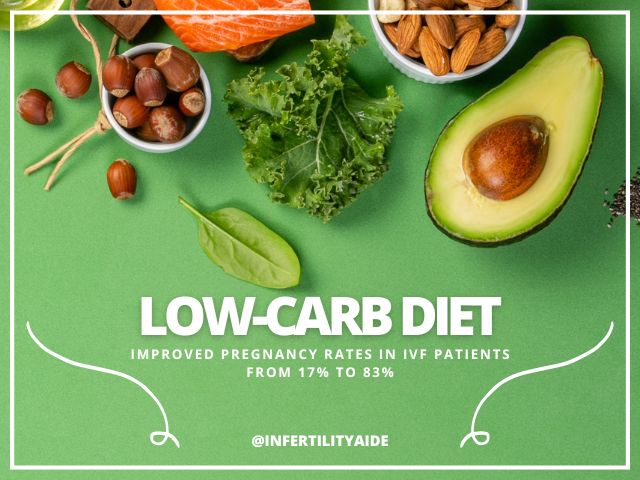A low-carb diet improves IVF success rates significantly, a recent study has revealed.
An American IVF specialist noted a pattern in his patients—the ones on a high protein, low-carb diet got pregnant a lot easier than those who were consuming too many carbs.
Patients considering IVF treatments always been advised to focus on their nutrition and exercise for improving egg quality before IVF, but is keto diet good for IVF?

Is low carb diet good for pregnancy?
Yes, a new study presented by Dr. Jeffrey Russell, MD, from the Delaware Institute for Reproductive Medicine in Newark, found that reducing carbs and boosting protein intake significantly improved the chances of conception in women.
The effect is “at the egg level,” said Dr. Russell, while presenting the findings at the 61st Annual Clinical Meeting of the American Congress of Obstetricians and Gynecologists.
Diets that are high in carbs create a hostile environment for the egg, even before conception is achieved.
“Eggs and embryos are not going to do well in a high-glucose environment,” he said. By increasing your healthy protein intake, “you’re bathing your egg in good, healthy, nutritious supplements.”
How are carbohydrates related to infertility?
Dr. Russell decided to conduct this study after he started noticing poor quality of embryos in IVF patients, who were young and healthy.
“We couldn’t figure out why. They weren’t overweight, they weren’t diabetic,” he said.
The study involved 120 women, who were 36-37 years of age, and asked them to log their 3-day diet. Based on this they were divided into two groups:
- Low protein group: Women whose diet had 60%-70% carbohydrates as they were eating “oatmeal for breakfast, a bagel for lunch, pasta for dinner, and no protein.”
- Adequate protein group: Women whose daily diet comprised atleast 25% protein.
Both groups of women had similar average body mass index (approximately 26 kg/m²).
The IVF results between the two groups of women showed a stark difference: Blastocyst development in the high-protein group was 64% as compared to 33.8% in the low-protein group.
Clinical pregnancy rates were also significantly higher in the high-protein group at 66.6% vs 31.9% in the low protein group, and live birth rates were 58.3% vs 11.3%.
Dr. Russell noted that the clinical pregnancy rate was up by 80% in women whose diet had more than 25% protein and less than 40% carbs.
What is the best diet for IVF fertility?
“There is no caloric restriction, but they have to get above 25% protein. This is not a weight-loss program, it’s a nutritional program,” said Dr. Russell, who asks all his IVF patients to cut down on carbs and increase their protein intake.
“It’s about eating healthier to get pregnant,” he said.
Read more about the best IVF diet to conceive.
Dr. Russell’s study found that young women with failed IVF cycles, saw a massive improvement in IVF outcomes after switching to a low-carb, high-protein diet. The subsequent IVF cycles after upgrading their diet improved their clinical pregnancy rates from 17% to 83%.
Doctors have found that a low carb diet improves IVF success rates; is that an easy change for you when you’re trying to conceive? For more information and planning affordable IVF, get in touch using the red contact button on this page.
References
Does changing a patient’s dietary consumption of proteins and carbohydrates impact blastocyst development and clinical pregnancy rates from one cycle to the next? DOI: https://doi.org/10.1016/j.fertnstert.2012.07.167